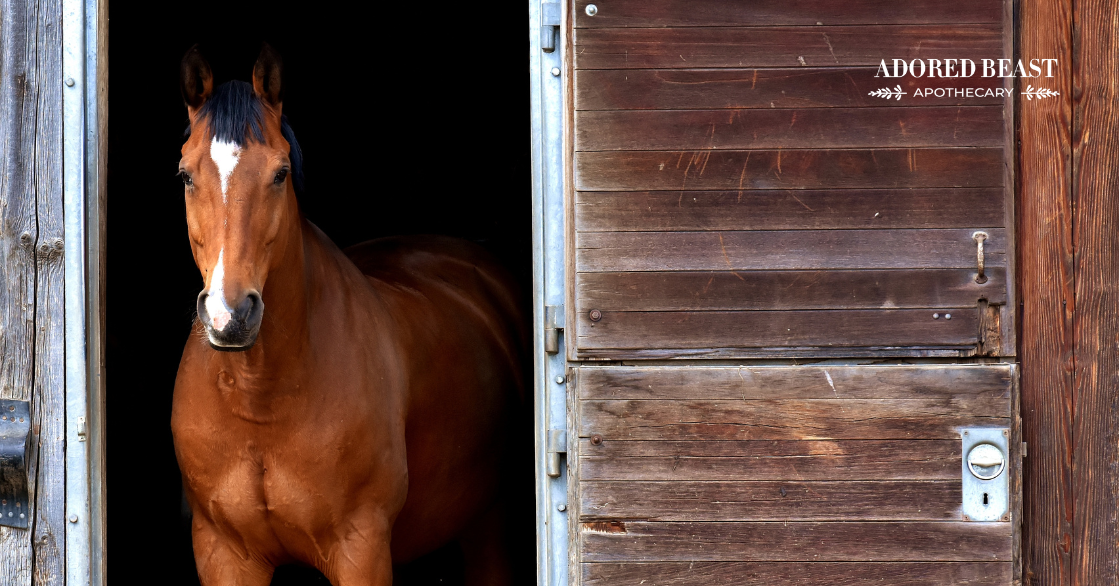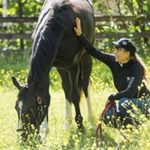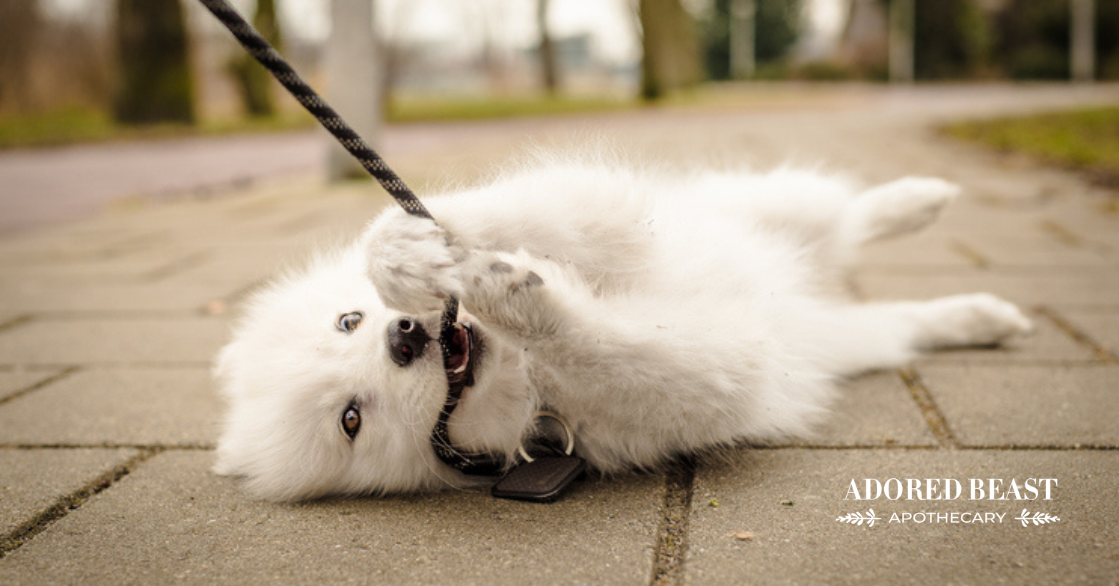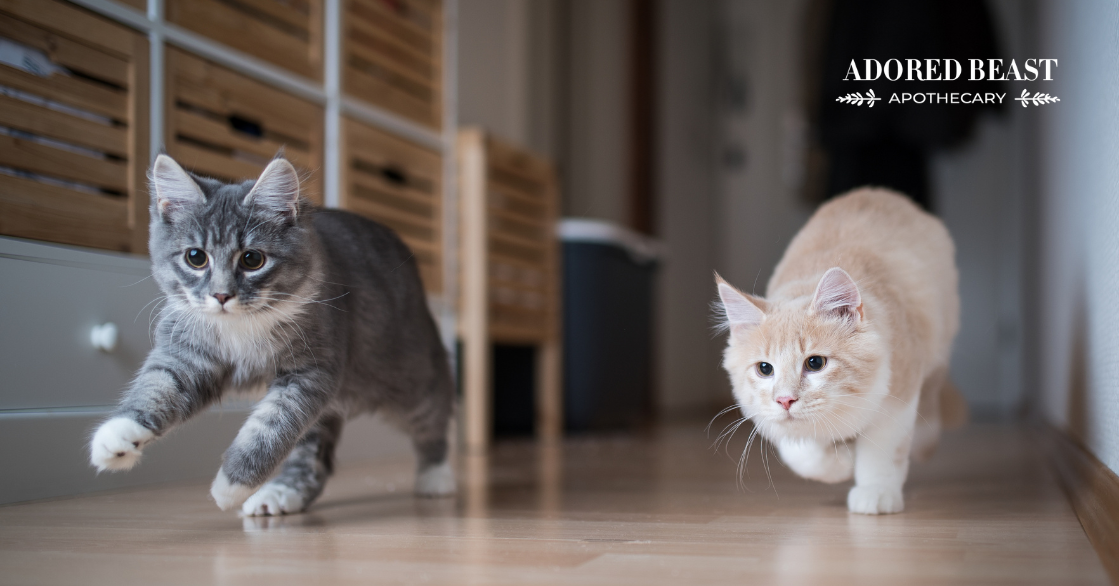Colic in horses is often unpredictable, and our equines are prone to it. No one likes to receive the call that their horse is in distress or to go down to the barn and see the beginnings of this condition. It’s enough to send any horse owner into a panic.
Estimates suggest 50% of equine deaths are related to colic and gastro-intestinal (GI) disease. Studies show that the risk of GI disease increases with specific stable management practices and is largely preventable if one stays vigilant and highly aware of the management practices that increase your horse’s risk for colic. Today’s article is all about prevention and helping your horse’s gut become as healthy as possible.
What is Colic in Horses?
Colic in horses has a few different causes but often presents as acute abdominal pain. Symptoms include:
- pacing, restlessness
- frequent rolling
- lying upside down
- lying down with legs stretched out
- increased heart rate
- little or no gut sounds
- sweating
- lack of bowel movements or small, dry bowel movements
- mucousy manure
- low appetite
- change in drinking behaviour
- biting at sides
- tacky gums
A key factor in the natural physiology of horses is that they do not have a vomit reflex so they cannot expel food through the esophagus or the mouth. This means we must take very special care to ensure the gut is always moving from front to back.
Causes of Colic
Science tells us that there are several causes of colic in horses:
- Impaction: Impactions can occur anywhere along the gut, however, there are a few narrow sections of the GI tract where impactions most commonly occur. Causes for impaction can include:
- a blockage of hay in the digestive tract
- course feed
- dry feed, decreased water intake and dehydration
- poor intestinal motility
- ingestion of large amounts of foreign materials such as sand or wood
- Gas: Excessive gas build-up in the colon can cause major GI discomfort. Horses can experience this due to a sudden change in the microbial community within the colon. This can occur due to sudden hay or feed changes or highly fermented feeds. Gas can also cause the GI tract to shift which can lead to displacement (see below).
- Colon Displacement: The colon can become displaced which can cause a twist or kink in the line and it can even hook over other internal organs, often the kidney. A colon twist can cause damage or death to the tissue if blood supply is cut off for too long. It is extremely painful and requires emergency surgery.
- Decreased Blood Supply Along the GI Tract: Along with intestinal twisting, poor blood supply can occur in older horses that develop fatty tumors (lipomas) which can wrap around the intestine. Another cause of poor blood flow is parasite infestation.
- Decrease in Gut Motility: Gut motility can decrease due to poor feeding practices where infrequent feeding occurs or the microbial community is altered or unhealthy. Horses who are not having frequent bowel movements can suffer from toxic overload from by-products of gut fermentation that don’t exit the body quickly enough and instead get re-circulated in the blood stream.
Risk Factors for Colic in Horses
A meta-analyses published in 2019 was conducted to determine the major contributing factors to digestive disease and colic risk. (1) Other more recent studies have shown additional risks which are cited below. Below is a summary of associated risks:
- Housing: Increased stall time within previous 28 days, change in housing within previous 2 weeks, cribbing behaviour, seasonal shifts (fall and spring), number of hours stabled per day, no pasture time or change in amount of pasture time within 2 weeks, 5-7 days of hospitalization time
- Feed: Alfalfa hay (70% or higher), change in batch of hay within previous 2 weeks, change of feed/grain within previous 2 weeks, hay containing high starch (NSC), round bale hay, daily oats, whole grain and ground corn
- Water: Decreased water intake, no water access
- Exercise: Less than 1x weekly, recent change in exercise program, show activity
- Parasites: Increased number of dewormings, lack of parasite management (via fecal testing or worming when appropriate), parasite infestation
- Transport: History of transport within previous 24 hours
- Vaccination: Increased risk with some vaccines
- Detail Issues: Severe orodental disease
- Seasonal: July-Nov, 6 and 12 month cycles, significant change in weather within previous 3 days.
- Anti-Inflammatory Drug Intervention: Non-Steroidal Anti-Inflammatory Drugs (eg. Bute, Bananmine, Previcox)
- Antibiotic Intervention: Antimicrobial agents can drastically change the gut microbial community, causing excess gas, colitis, and increased colic risk (2)
- Intestinal Infection: Salmonella, E. coli, Slostridium perfringens type A, Aspergillis (fungus) (2)
Ultimately, these studies show that stress (in its many forms listed above) is a key factor in the development of colic in horses. It’s critical that you keep your horse as physically and mentally stress-free as possible. You can mitigate stress in a number of ways through good nutrition, stable management, and exercise and transport practices.
Long Term Colic and GI Disease Prevention Strategies
- A healthy diet: Diet is a wonderful place to start when it comes to keeping your horse’s gut healthy. As previously mentioned, horses are sensitive to large amounts of protein, grain, and starch. To learn the ins and outs of creating the healthiest equine diet possible, check out our equine nutrition article and how to assess hay quality.
- Eliminating glyphosate intake: Through conventional feed programs, many horses ingest large amounts of the herbicide glyphosate. It is sprayed on conventionally grown wheat, corn, sugar beets, and soy, which are commonly used in horse feed. It’s important to eliminate this chemical since it is a patented antibiotic that can affect the gut microbiome and is also a “probable” cancer-causing agent, according the FDA. To learn more about glyphosate, click here.
- Adding supporting herbs and supplements that fit your horse’s needs: Since colic in horses can be a sign of underlying digestive disease such as colitis or ulcers, it’s important to provide nutritional support that helps prevent inflammatory processes in the GI tract. Including the following herbs and nutraceuticals can be extremely effective at reducing GI disease risk:
- a variety of prebiotic fibres including non-GMO beet pulp, dandelion, clover, cleavers, rosehip, marshmallow root, flax seed, chia seed, and larch extract
- a variety of probiotics (especially for horses with little to no soil/turnout access), including as many strains as possible. Species specific strains of probiotics are also useful in giving your horse an added advantage in their gut health
- stabilized plant-based omega 3 fats in the form of chia and flax seeds (not oil) are often left out of the equine diet but can add powerful anti-inflammatory and anti-oxidant benefits, particularly when it comes to the gut
- L-glutamine – an amino acid that is well-studied for facilitating quick repair of the GI lining and mucosa
- medicinal mushrooms – adaptogenic mushrooms such as turkey tail and chaga can help take your horse’s overall immune and gut function to the next level
- Increasing gentle movement and field access: This should always be done gradually but increasing exercise and field time can help with gut motility and circulation as well as support a healthy gut microbiome. To learn more about the benefits of turnout for horses, check out this article.
- Reducing metal and physical stress: There are many ways your horse can become physically or mentally stressed (as outlined in the studies above). Be sure you are paying attention to what your horse is telling you through their body condition, their behaviour, individual stressors, their manure, their eating habits, and by assessing the quality of their diet, exercise and environment. To learn more about how to prevent all types of stress that lead to GI distress, check out our equine ulcer article.
Homeopathy and Other Tools to Add to Your Colic First Aid Kit
Along with your regular colic first aid tools, such as Banamine paste for pain management, there are some integrative tools you might also want to have ready if tragedy strikes. I always keep the following homeopathic remedies in my first aid kit for my horses:
- Arnica 1M
- Aconite 1M
- Colocynthesis 200C
- Nux Vomica 200C
- Phoshorus 200C
- Arsenicum 200C
Have a homeopathic practitioner guide you through which remedies to use during an emergency since repetition and combinations may vary depending on the case and quick action is often a necessity. Homeopathy is safe to give with medications such as NSAIDs including Banamine.
Magnesium citrate – I always have powdered magnesium citrate in the barn. It is well-known for reducing cramping and contractive processes in body tissues. You can administer up to 3000 mg of magnesium citrate dissolved in water and given by syringe to help alleviate cramping pain. This is also safe to give with NSAIDs.
Call Your Vet Immediately
Of course, you should always call your vet to come out if you suspect that your horse is colicking but you can administer medications, homeopathics, and magnesium to facilitate positive changes before your vet arrives.
I hope this article helps you feel more empowered when it comes to preventing and managing colic in your horses.












![[RESEARCH] Is Herbicide Safe for Dogs?](https://blog.adoredbeast.com/wp-content/uploads/2025/06/herbicides-safe-for-dogs-103x55.png)